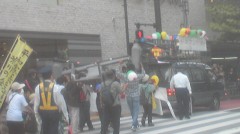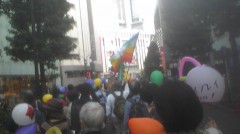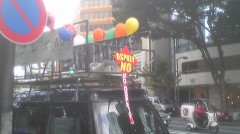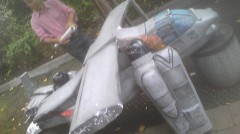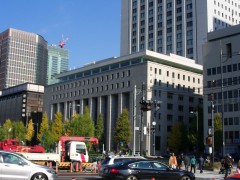31 December 2012
Americans as oppressors to Japanese
18:03 Posted in Japan News, Politics, US-Japan relationship, USA issues | Permalink | Comments (0) | Tags: military, nuclear aircraft carrier, okinawa
08 October 2012
Japan's protest against Osprey (MV-22) deployment
Joined demonstration march in Shibuya, most crowded shopping and entertaining district in Tokyo.
Estimated around 400 people participated. 12 ospreys were deployed in Okinawa, Southernmost island of Japan. Osprey is a hyprid helicoptor that cause strong noize and probability of accident is higher than conventional helicoptors. Propellers work as helicoptor on pad but when it goes high, the mode is changed to airplane that enables it fly further.
But this mode change action can cause severe accident including crashes onto the ground without control.
It is said that US military deployed Ospreys in Okinawa because they were not allowed to maneuver flying in their homeland because of safety problems, that aggrevated Okinawans and Japanese nationals. US-Japan treaty is one between independent sovereign nations.
As other issues such as Nuclear aircraft carrier (CVN 73) in Yokosuka, safety may not be prioritized issue. Highest prioritized issue is why we have to carry burden of US military which does not actually defend us. Threat from China? China is no longer enemy for the U.S. China has become even more important economic ally than Japan for the U.S. Even US influential congressman said military stationed in Okinawa is nothing but ruin of the Cold War.
Recently even after deployment of the new helicoptors, Chinese ships has invaded Japanese sea near Okinawa very frequently. If deterrence works, why do Chinese do that?
We really wonder why US military is stationed in our country.
We should stop treating America as friendly nation although it is not our enemy.
20:53 Posted in Japan News, Politics, Tokyo Life, US-Japan relationship, USA issues | Permalink | Comments (0) | Tags: military, okinawa, nuclear aircraft carrier, osprey
20 March 2012
Film "Working Girl" Back to 1980's
Working Girl is a 1988 romantic comedy film, which tells the inspiring story of a Staten Island-raised secretary, Tess McGill (Melanie Griffith), working in a Wall Street investment bank. When her boss, Katharine Parker (Sigourney Weaver), breaks her leg skiing, Tess uses Parker's absence and connections, including her errant beau Jack Trainer (Harrison Ford), to put forward her own idea for a merger deal.
It was a typical success story. She suceeded in business and love and got promoted. The film reflected 1980's social phenomenon like feminists arising. More women in business fighting against male cheuvinism in the industry and economic booming by financial sector such as merger and acquisition. The scenes were shot in the World Trade Center which was later destroyed by 911 terror attack.
However these things have become outdated lately.
Feminism is no longer a big issue. It is because gender equality has reached certain level so there is not much needs like in the past. In the mid-management position, in the US, women accounts for 40% of all the positions in business. Of couse glass ceiling still exists, in top management positions like CEO, women only accounts for 10%. In Japan 10% is ratio in mid-management position, ratio in top management is only 1% or less. But no one argues women working in top positions in the business or politics. Now it is a matter of time and efforts for individuals to get what they want regardless of gender.
But ironically, people have become more conservative recently. Although public attitude changed, women traditionally face difficulty breaking barriers which precedors already created and continued for so long. Women are no longer exluded but still not welcome and not suitable in male dominated sector. In fact not many women want to do totally same things as men do. Girls are girls and boys are boys anyway.
After all, even rich, successful and independent women want to get married to richer and more successful guys.
Lately backlash has come, more younger women want to be housewife because that is easier in economic recession and people discovered being good wife and wise mother is one of greatest choices in life. In the old days women could hardly chooose the way to live. Besides being housewife and mother was secretary, teacher or nurse. Now housewife is what they can choose besides working girl. In fact they can do the both if they want to. Recent feminist film "Mona lisa smile" implied traditional role of women is not bad at all although you do not have to comform to what the society expects you to be.
The other thing outdated is business success, especially in financial sector. After Lehman Shock and Occupy Wall Street movement, financial sector seemed to be con and dirty business that exploits many commoners in the society. Merger and Acquisition was a kind of money game which never cared about people working in companies.
Although people wanted to be and believed to be richer, only a few of them could achieve that. Just 1 % of people occupy vast majority of the wealth in the society.
Success in business cannot always link to happiness in life. Working all day long and no time to use money for fun. No time to have good communication with your family. You have no friends and no one to trust or nobody who trusts you. What does money help you?
Furthermore, because of necessity of economic growth, our earth and lives are in danger such as global warming by carbon dioxide and recently radioactives from nuclear power plants. To grow more states and corporations have to exploit more natural resources and take huge risks for our lives.
Our lives, happiness, environment are at risk for materialistic success. That kind of things shouldn't be valued in motion pictures any more.
We are now living in a different era from 1980's materialistic era. We have to think and change.
10:13 Posted in Film, Society, USA issues | Permalink | Comments (0) | Tags: feminism, women, fukushima
07 December 2011
Book on US Occupation of Japan after WW2 "Washington Heights"
A book "Washington Heights" is written by a female journalist, AKIO Satoko. She studied how the United States government managed occupied Japan after the country defeated his enemy. Then she spotlighted on "Washington Heights," which was exclusive residential area for the U.S. military personnels located in the center of Tokyo. The area was built after the war was over by the order of U.S. occupational force. Before the war, it was Japanese imperial army's property. It was located next to Meiji Jingu Shrine, memorial shrine for the Meiji Emperor (crowned between 1868-1912) .
After the Olympic the place turned to famous public park, Yoyogi Park and Japan's public broadcasting station, NHK building.
The book mainly described episodes of Japan's Occupied era (1945-1952) and economic booming era until Tokyo Olympic in 1964. When the U.S. force arrived in Japan, they occupied many places in Tokyo for its administration purpose. The General Head Quarter was placed in Dai-ichi Life Insurance Building near the Imperial Palace.
But they needed housing for soldiers and staff working for the G.H.Q. So they ordered the Japanese government to build housing block for Americans, requiring facilities and equipment equivalent to American standard of that time. That was the hell of a big job for the Japanese government because the places were all burnt down, and shortage of goods.
The Washington Heights, American style housing provided Japanese new culture and lifestyle. Because American personnels and their family living there wanted entertainment, many Japanese entertainers were recruited for performances for them. That caused a big entertainment icon, Journey's Production, which has released many great talents to Japan's showbiz until now. Morie Hana, a famous Japanese fashion designer opened clothing shop for women living in the residential area. She studied most sophisticated western clothing during that time. As for food culture, Japanese learnt fresh vegetable farming to meet demands from Americans. Japanese learnt how to farm vegetable for the fresh salad taking sanitation into account.
As for how Americans thought about occupying Japan was described as well.
When Americans first arrived in Japan after the war, they were surprised because their former enemy citizens were so friendly to them. Many Japanese in fact, felt liberated when the war was over. So occupation worked more smoothly than expected. The U.S. occupation in fact provided democratization of Japan including women's suffrage, reform of biased wealth distribution towards elite class. The U.S. aim was to demilitalize Japan so they thought cracking down feudal customs and elite class power was best way to do.
The U.S. at that time were so worried about communist threat from Soviet Union. So they treated Japan nicely although Japan was a former enemy.
Most interesting episode noted in the book was that a former Japanese military officer met Afro-American man working as lower rank staff of G.H.Q. who told him that Blacks were glad when Japan attacked Pearl Harbor.
The conclusion of the book was U.S. occupation provided Japan great things but we have to remember Japan has been controlled by U.S. since that time and even after Japan recovered independence, we are always facing indirect occupation by the U.S. such as military bases in Okinawa, Tokyo, and diplomatic pressure to liberalize trade and commerce.
Recently the U.S. hegemony has been on the edge as you see "Lehman Shock" and "Occupy Wall Street" movement. The U.S. can no longer function as a role model for Japanese.
Thanks to the U.S. we could have developed the nation acquiring many great things from them but it is time we develop us ourselves in our own way.
22:01 Posted in Books, Culture, Tokyo Life, US-Japan relationship, USA issues | Permalink | Comments (0) | Tags: history, military






